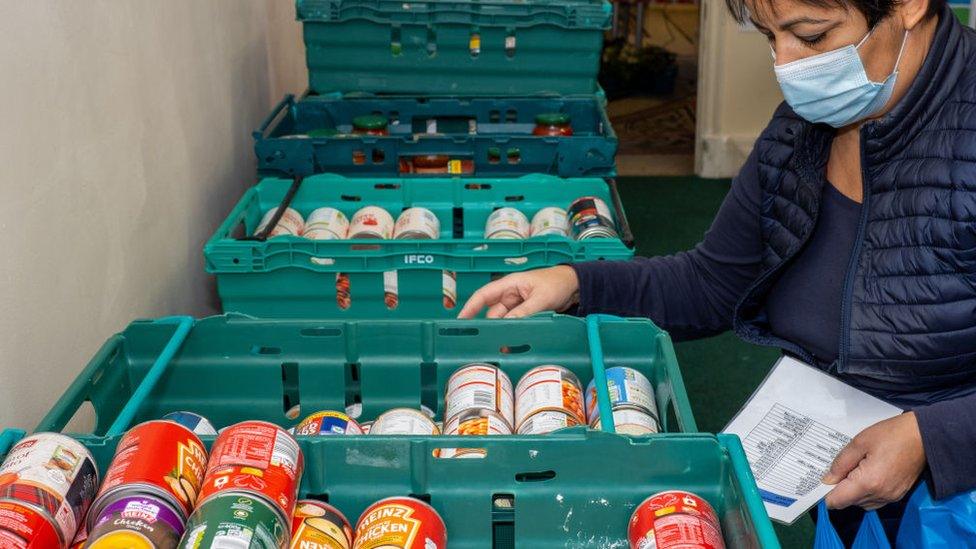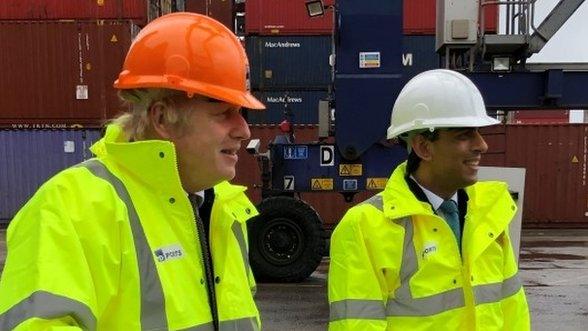Budget 2021: 'Scrooge Sunak not levelling with people' on cuts
- Published
- comments

Campaign groups say half a million people risk being dragged into poverty
Public spending cuts in Rishi Sunak's Budget mean the chancellor "isn't really levelling with people", the Institute for Fiscal Studies (IFS) think tank has warned.
The Treasury said the cuts, worth £4bn, were "a purely mechanical change", but Paul Johnson of the IFS said they were set to cause more pain.
At the same time, big tax rises were "screeching U-turns", Mr Johnson said.
"Santa Sunak" was now looking more like "Scrooge Sunak", he added.
Meanwhile, "pressure will mount" on Mr Sunak not to cut universal credit by £20 a week after September, Mr Johnson said.
He said that going for such a "cliff-edge reduction" was "remarkable".
'Two Budgets'
In his post-Budget analysis, Mr Johnson highlighted freezes in income tax allowances and rises in corporation tax.
The corporation tax rise to 25% would take the UK "well up the international league table" for revenues, he said, but it was "50-50 at best" whether it would actually happen without additional concessions.
"This was, of course, a tale of two Budgets," said Mr Johnson in response to Mr Sunak's economic plans.
"By the end of the forecast period, we are looking at a fiscal tightening of over £30bn relative to previous plans.
"Take account of the cuts to planned spending announced in the autumn and Santa Sunak, purveyor of billions today, looks more like Scrooge Sunak, cutting spending and raising taxes to the tune of nearly £50bn relative to his pre-pandemic plans of March 2020."

Are you receiving universal credit? Share your experiences by emailing haveyoursay@bbc.co.uk, external.
Please include a contact number if you are willing to speak to a BBC journalist. You can also get in touch in the following ways:
WhatsApp: +44 7756 165803
Tweet: @BBC_HaveYourSay, external
Please read our terms & conditions and privacy policy

The income tax allowance freezes were set to raise about £9bn, while the corporation tax changes could see revenues rise by more than £17bn by 2025, Mr Johnson said.
He was sceptical that the plans to cut a further £4bn from public spending could be delivered, saying they would cause "additional pain" if they went ahead.
"Now these are not firm plans, but they are the basis for the future public finance estimates. They are a very shaky basis," Mr Johnson said.
"This isn't just a mechanical change and presenting it as such means the chancellor isn't really levelling with people about the choices the government is making to repair the public finances."


The 24 hours after a Budget can be a perilous time for a chancellor. They can be undone even on the back of relatively small tax rises, let alone the biggest ones in more than a quarter of a century.
The "post-match" analysis from the Institute for Fiscal Studies can condemn a Budget in the history books. The chancellor has a massive challenge and a tumultuous uncertain backdrop, but he has the benefit of a solid majority, unlike his recent predecessors.
So it is with some relief that Number 11 will have seen the analysis of the respected institute and others such as the Resolution Foundation. They point to plenty of gaps. The plans imply further cuts to unprotected public spending. That includes social care spending within local authorities, for example. There is some doubt that the hike in corporation tax will really yield £17bn a year. Difficulties here, or in the post-pandemic recovery in general, will lead to further spending squeezes and tax rises.
However, it is not really possible to assert that unequivocally. The chancellor has not constrained himself to meet borrowing targets as part of a set of rules. He outlined some principles around borrowing only to invest. But if he were facing pressure to increase taxes further in the year before an election, for example, it is equally plausible that higher-than-expected borrowing would take the strain.
The world is too uncertain to be wearing fiscal straitjackets. And every time it has been required, on more than a dozen occasions, the chancellor has extended spending on rescue support schemes. That has set up an expectation about, for instance, the new expiry of the £20 uplift to Universal Credit in October (now extended by six months). As Paul Johnson of the IFS puts it: "He has given us a sense of where he wants to go [on fixing the public finances], but he still has a lot of work to do and his spending plans in particular don't look deliverable, at least not without considerable pain."
That argument will be settled in the run-up to a Spending Review. If anything, the medium-term pressures on public services will be higher, reflecting issues such as big NHS waiting lists. For now, the Budget has achieved its two strategic aims: borrowing more now to extend immediate crisis support, then post-dating a huge cheque, paid for mainly by big business, to cover part of the bill. Most of the other parts in these plans can move and, if necessary, dramatically so.

Mr Johnson also criticised Mr Sunak's universal credit changes.
"It is, by the way, remarkable that while the chancellor felt the need for a gradual phase out of furlough, business rates support, stamp duty reductions and VAT reductions, he is still set on a cliff-edge reduction in [universal credit] such that incomes of some of the poorest families will fall by over £80 between one month and the next.
"Whatever the case for cutting generosity into the longer term, if you're going to do so, the case for doing it gradually rather than all at once looks unanswerable."
In a BBC interview, the chancellor rejected suggestions that he should have tapered the ending of the £20-a-week universal credit increase in order to minimise its effect on families.
"We have extended it generously and in full, but it's important to remember that it's one of many things that we're doing to support people," Mr Sunak said.
These included increases in the National Living Wage and offering help with council tax payments, he added.
Rishi Sunak says it will take "the work of many years, decades and governments" to pay back Covid debt
Earlier, the government came under fire from campaigners for doing too little in the Budget to address inequality.
The Joseph Rowntree Foundation and the Resolution Foundation said the cut in universal credit would bring the incomes of benefit recipients down to levels not seen since the early 1990s.
It would also pull half a million people into poverty, just as unemployment was expected to peak.
Mr Sunak's decision to spend even larger sums to support the economic recovery now and put off raising taxes until later was broadly welcomed in the Resolution Foundation's analysis of the Budget.
But it noted that while GDP is set to grow this year by 4%, that might not feed through to better living standards, with wages by the middle of the decade set to remain £1,200 a year - or 4.3% - below where they would have been without the coronavirus pandemic.
Austerity would drag on for some, it added, with day-to-day spending on government departments such as transport and local government set to fall in real terms next year and remain almost a quarter lower than a decade ago.
The Joseph Rowntree Foundation, an anti-poverty charity, said the universal credit changes meant single recipients of it would see their incomes cut by £20 a week, just as the furlough scheme is ended and unemployment was expected to rise to its peak, the foundation said.
It predicted that would pull half a million people into poverty, including 200,000 children, adding that the Budget was silent on helping 700,000 households who have fallen behind on rent because of the pandemic and are now at risk of eviction.
Responding to the Resolution Foundation's analysis, Mr Sunak told the BBC that it had hailed his decision to freeze income tax thresholds as a "progressive measure" and "a fair way to do what we need to do".


- Published4 March 2021

- Published4 March 2021
